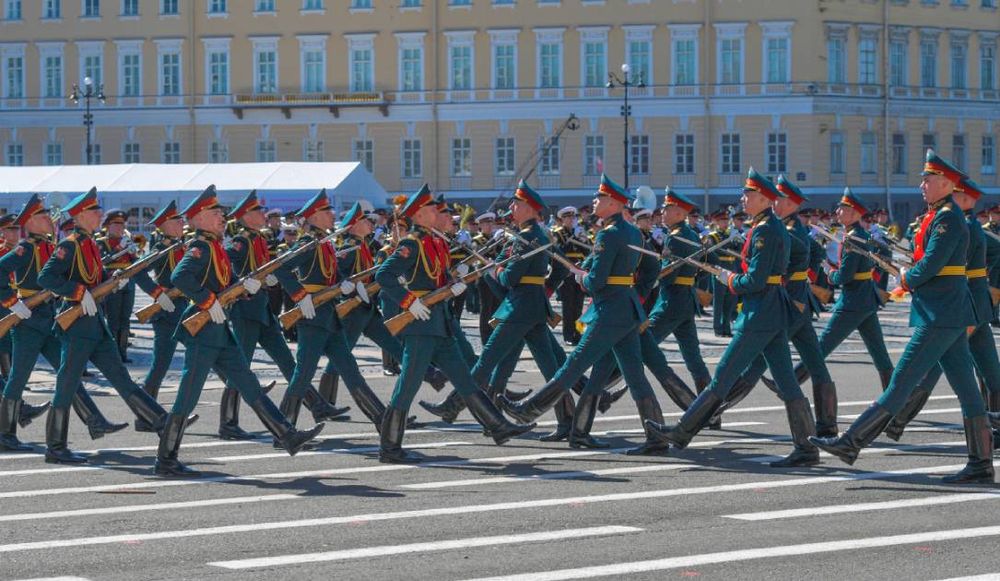Russian hackers hijack Ukrainian TV to broadcast Victory Day parade
Russia-aligned hackers hijacked several Ukrainian television channels on Thursday to broadcast a Victory Day parade in Moscow, commemorating the defeat of Nazi Germany in World War II.
According to the Ukrainian agency responsible for television and radio broadcasting, Nacrada, the hackers replaced the broadcast of at least 15 TV channels owned by Starlight Media.
The agency said the hackers interfered with the operation of Astra communication satellites owned and operated by the Luxembourg company SES. According to SES, such interventions “happen all the time” and usually originate from Russia, Nacrada said.
“This is another stage of the information war against Ukraine when Ukrainian media and consumers of information become the direct object of aggression,” the agency said.
Ukraine recommended broadcasters use “alternative methods” of receiving the signal and to promptly respond to interventions.
Also on Thursday, hackers commandeered Latvian television network Balticom to broadcast the parade in Moscow, according to Latvia’s chairman of the National Electronic Media Council (NEPLP) Ivars Abolins.
According to NEPLP, Balticom’s own infrastructure wasn’t compromised but a cyberattack targeted Balticom's interactive TV server, which is based in Bulgaria.
Latvia’s computer emergency response team (CERT.lv) said the incident “is part of the Russian hybrid war, and such provocations are likely to continue in the future.”
In response to Russian attacks, suspected Ukrainian hackers hijacked several TV channels in Crimea, a Ukrainian peninsula annexed by Russia, according to Oleg Kryuchkov, an official with the region’s administration.
Russian media also reported that the networks of several broadcasting services in the Russian regions of Bashkiria, and the cities of Orenburg, Omsk, and Irkutsk were also hacked to broadcast videos related to Ukraine, as well as headlines from opposition media.
Hacks of the media, including television channels, are common during the cyberwar between Ukraine and Russia, especially during important political events such as the May 9 parade, when Russia, Belarus, Georgia, Armenia, and several other countries commemorate the Soviet Union's victory in 1945.
In April, pro-Russian hackers hijacked Starlight Media to broadcast Russian advertising and a fragment of the Swan Lake ballet, which was aired in Russia during the collapse of the USSR or other political turmoil.
Last year, hackers replaced broadcasts of Vladimir Putin’s Victory Day parade with an antiwar message that read: “The blood of thousands of Ukrainians and hundreds of murdered children is on your hands.
Two months later, in July, two radio stations owned by one of Ukraine’s largest broadcasters were hacked to spread fake messages that President Volodymyr Zelensky was hospitalized and in critical condition.
Ukrainian digital media is also a frequent target. In February, Russian hackers breached several popular Ukrainian media outlets, posting fake news related to the war. All of these websites were hacked to spread the same piece of fake news — that Russia destroyed a unit of Ukrainian special forces in the eastern Ukrainian city of Avdiivka.
“The enemy is interfering with the operation of the Ukrainian broadcasters to spread propaganda,” Nacrada said. “This creates additional and deepens existing threats to Ukraine's national security.”
Daryna Antoniuk
is a reporter for Recorded Future News based in Ukraine. She writes about cybersecurity startups, cyberattacks in Eastern Europe and the state of the cyberwar between Ukraine and Russia. She previously was a tech reporter for Forbes Ukraine. Her work has also been published at Sifted, The Kyiv Independent and The Kyiv Post.



